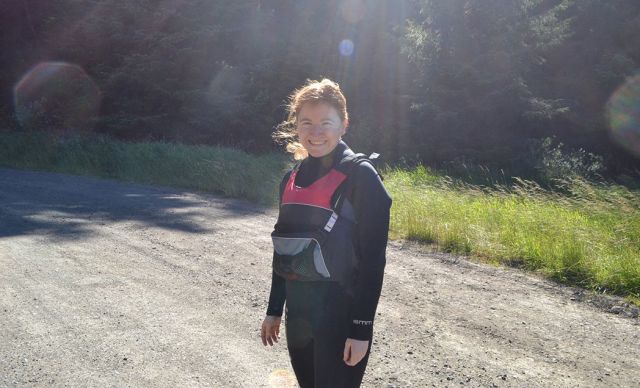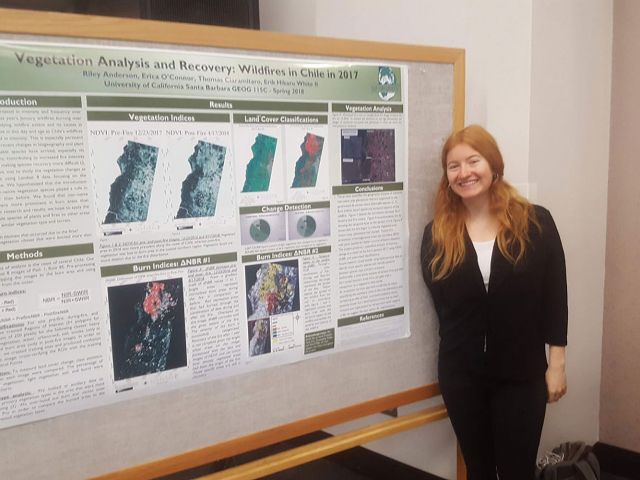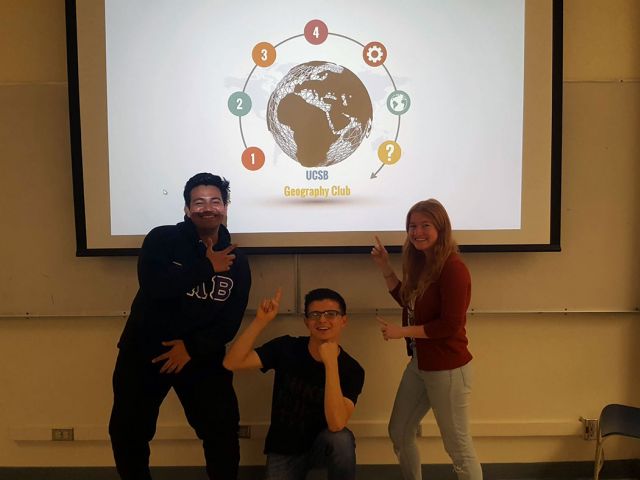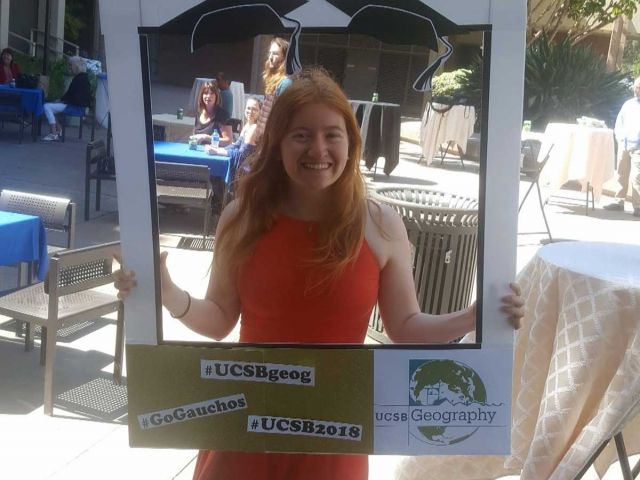
Undergraduate Spotlight: Riley Anderson
Riley Anderson graduated in 2018 with a B.A. with GIS emphasis and a Spanish minor.
Why did you choose the Geography major?
I was obsessed with maps and social studies as a child. In middle school social studies, I learned about how the rocky, mountainous terrain of the Mediterranean region influenced ancient Greece to rule by separate city-states rather than an all-powerful capital. I found this fascinating and decided I wanted to study geography in college. My college advisors in high school told me they had not yet had a student that wanted to pursue geography! After researching the different subfields of geography, I felt that the GIS route would allow me to work in a diverse range of fields by granting me skills to analyze and map any spatial phenomena.
What things did you do in your time as a Geography major (favorite classes/ research projects/ field trips)?
The Urban Environment (GEOG 130) involved multiple independent field trips to different sites along the urban/exurban gradient of Santa Barbara. We had to do field research on the solar radiation, vegetation, soil, and water without any equipment, which required more creativity and critical thinking. I really appreciated that the homework required students to explore the city around them, which they otherwise might not have time to do. Environmental Impacts in Human History (GEOG 140) was the most interesting class I had; we read about 9 different books with time periods spanning the beginning of the universe to the modern day. The term research paper was my first introduction to geography research and strengthened my time management and writing skills. The GIS and remote sensing group research projects that took place in the last courses of the series (176C, 115C) were fun bonding experiences with other graduating students and helped me discover what sort of research I wanted to do in graduate school.
What do you do now? What do you like best about it?
I work as a GIS analyst for Quartic Solutions, a GIS firm and long-standing Esri partner in San Diego. We provide GIS services and support to local governments and companies. I have been providing full-time COVID-19 mapping support to our county since late 2020. I geocode new COVID-19 cases, produce our daily case maps, update the testing site and vaccination site maps, and manage the ArcGIS Dashboards that display COVID-19 statistics and vaccination numbers. Prior to this assignment, I helped a local fire prevention organization analyze fire threat and the city of San Diego manage their ArcGIS Enterprise databases and utilities/transportation applications. I love that my job is fully remote so that I can work from my rural hometown, and that my company is a small woman-owned business that supports employees furthering their education and technical expertise with Esri technical certifications and GIS Professional certifications.
What do you find most interesting/challenging/inspiring about your work?
The challenging aspect of my work is that as a consultant, I must be able to switch between different clients’ projects during the week or month, which often means switching between GIS software as well. This requires knowing how to do similar geospatial analyses with different tools and workflows. However, this is also the most interesting aspect of my work, because I get to work in different fields, such as environmental consulting, public health, utilities, and transportation. I also get to network with different GIS professionals around Southern California, which is an amazing job perk.
Do you have any other professional experiences (ex: jobs, internships, research projects) from the past to share about?
The undergraduate remote sensing series of courses inspired me to pursue remote sensing research in my M.S. Geography program at University of Oregon. My master’s thesis involved field work in the South Slough Estuarine Research Reserve in Charleston, Oregon, where I collected drone imagery of eelgrass with my FAA remote pilot license. In my analysis I compared traditional imagery classification methods (pixel-based) with object-based image analysis and incorporated spatial ecology by quantifying change in patch shape complexity and fragmentation from past aerial imagery. In my time there I also served as a Teaching Assistant for a variety of physical geography and GIS classes. In my last two quarters I was a Lab Assistant in a social studies computer lab, where I helped students on their GIS assignments and helped professors and students transition from Esri’s ArcMap to ArcPro.
How has your education/background in Geography prepared you for your career?
Having a geography background has trained me to always think spatially. Being educated in the concepts and theories of geography has set the foundation for my technical skills. Having a large toolbox of technical knowledge is not very useful when you don’t know what questions to ask and the different perspectives from which you can approach problems that involve space. I can quickly produce maps and spatial analyses while being aware of potential biases and misrepresentations in the visualizations or data reports. I am grateful to have received both critical thinking skills and exposure to the software, terminology, and workflows that set me up for stepping right into my career after graduating from higher education.
Any advice for Geography undergrads? To recent alumni?
My advice for undergrads would be to take advantage of the amazing Geography community at UCSB and in Santa Barbara county. The staff, faculty, and students in the Geography department were among the most interesting and friendly people I’ve met in my life and I miss them dearly! Also, support the Geography Club! For alumni, don’t forget that the critical thinking skills that we learned from geography can be used in nearly any field. Think out of the box when you are job hunting, and don’t be afraid to try to connect your geography background with your hobbies or other interests.
What else do you enjoy doing outside of work?
Running, hiking, having bonfires, working on my Spanish skills, learning about nutrition, and trying new vegan recipes.


